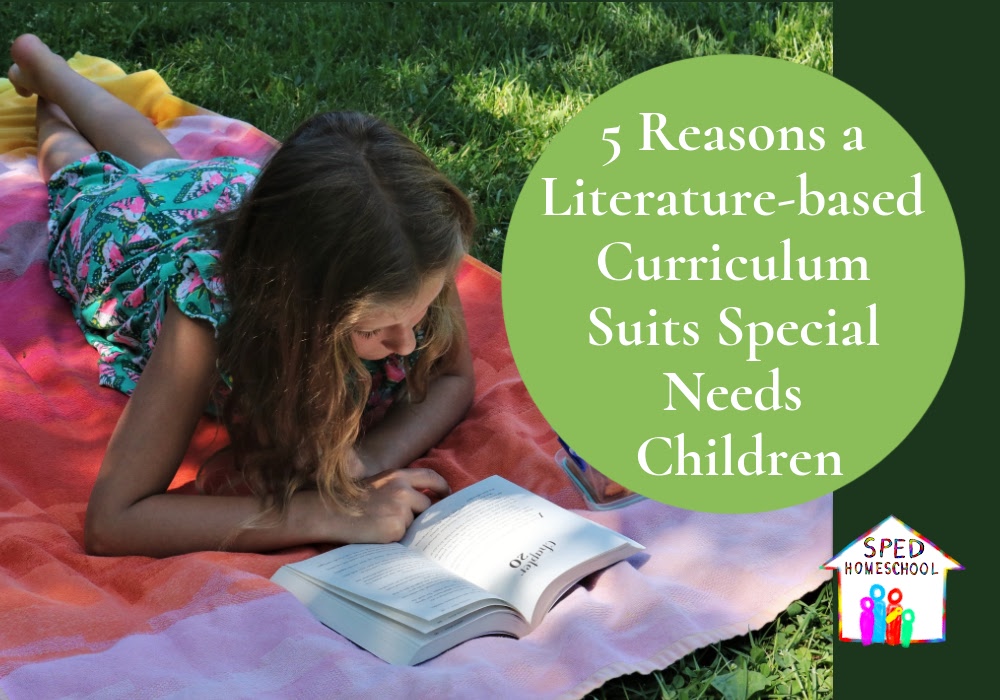
Sonlight Curriculum SPED Homeschool Partner
If you took a poll of special needs families, you would likely find one thread that is common among every single family: flexibility. Because flexibility is so critical when raising special needs children, choosing a literature-based homeschool—the most flexible of the curriculum-based approaches—makes so much sense.
1. Literature-based Learning Allows Flexibility in Environment
With a literature-based education, days are more organic. Rather than forcing our children to sit still at a desk for long periods of schoolwork, we can allow them to draw, build with blocks, or stretch out on the couch while they learn.
When my oldest son was young, he struggled with dysgraphia, and we worked with an occupational therapist for quite some time. He hated writing, but he quickly learned that he loved to draw while I read aloud. This gave him the flexibility to work on his fine motor skills without really noticing that he was improving his fine motor muscles. Now, ten years later, you’d never know the struggles we had early on. I attribute our Sonlight Read-Alouds to his tremendous success in overcoming dysgraphia.
Literature-based learning also lends itself to flexibility in our surroundings. It’s really easy to take our reading outside on nice days, and small changes like this can really help our sensory craving children to thrive. We’ve read on the grass, in the swing, on a tree, and in the car. Anywhere that you can take a book becomes a classroom when you use a literature-based curriculum.
2. Literature-based Learning Allows Flexibility in Format
Because much of the education in literature-based learning stems from discussion, we can teach subjects like science and history without paper and pencil, making those subjects more stress-free for those children who despise paperwork. While most people may be accustomed to worksheets and tests, a literature-based curriculum can set you free from the hum-drum of paper-based practice and assessment.
For example, Sonlight contains very little testing. With a literature-based program, children show their understanding of a subject through narration—repeating back what they learned in the reading. My children and I have
- learned geography by mapping the places we read about
- learned science through reading living books and doing fun experiments
- learned history through fictional accounts of true events
This type of education spells success for children who strongly dislike or struggle with paper and pencil work.
3. Literature-based Learning Allows Flexibility in Learning Styles
- Does your child love to write? Then have them take notes or doodle while you read.
- Does your child hate to write? Have them build with blocks or learn to sew while you read.
With a literature-based curriculum, you aren’t trying to stuff your child into a box. Instead, you give them the flexibility to be themselves. This is of the utmost importance with special needs children. They need the flexibility to learn in the way that is best for them without any stigma, and this is exactly the freedom that a literature-based curriculum offers.
4. Literature-based Learning Allows for Flexibility of Choice
Literature-based learning is so beautiful because of the choices available to you. Take Sonlight for example. In the elementary years, you have three to four choices of topics of study, so you are able to pursue your child’s interests in selecting each year’s program. What sounds more interesting? World history or US history? You can choose!
Choice can mean the difference between your child buying-in or checking-out on their education. Give your special needs child a reason to buy-in to their education by sitting down with the Sonlight catalog and helping you choose the curriculum for the year.
5. Literature-based Learning Allows for Flexibility of Schedule
There’s nothing quite as overwhelming as feeling that you are behind. Special needs families are especially aware of this constant pressure to keep up in the midst of fluctuating moods, non-stop doctor and therapy appointments, and the basic hum of life’s requirements.
With a literature-based curriculum, being behind really isn’t a problem. First of all, you’ll likely find yourself slightly ahead of schedule because of what I call, “One More Chapter Affliction.” This affliction affects probably 90% of all literature-based students. Symptoms include continually asking to read “just one more chapter, please.” This seems to be pretty much incurable and is usually characterized by a collective groan once the adult reading has worn out their voice and ended the read-aloud for the day. I tease, but in all seriousness, we love reading aloud so much that being behind schedule never worried me.
Also, when you have a literature-based curriculum, it doesn’t feel so much like doing school. So you can save a book for the summer or for bedtime reading, and catch up without pressure. You could just school all year by stretching out the curriculum over 12 months instead of 9. Or you have the freedom to skip a book all together without ruining the flow of the overall curriculum.
I believe that a literature-based education offers the most flexibility and the most organic learning experience of all the homeschool approaches. Both of these qualities make a literature-based education a great option for special needs children.
Did you enjoy this article?
Would you consider supporting the ongoing work of
SPED Homeschool?
Donate Today

